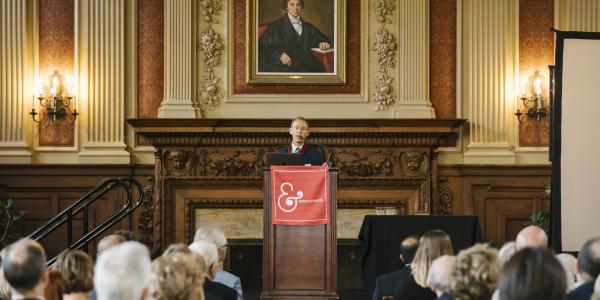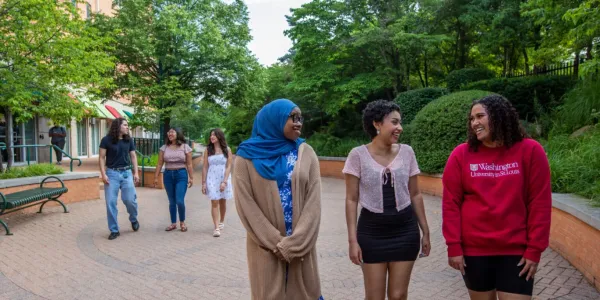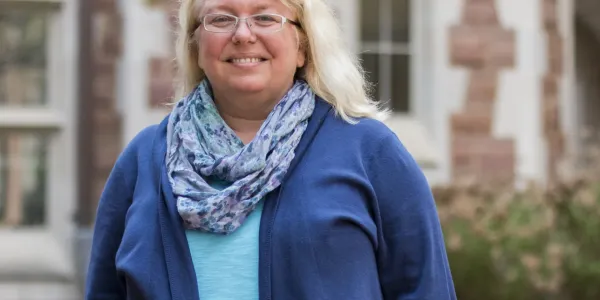
On Sept. 27, Kenneth Olsen was installed as the George William and Irene Koechig Freiberg Professor of Biology. The program included a welcome from Feng Sheng Hu, the Richard G. Engelsmann Dean of Arts & Sciences and Lucille P. Markey Distinguished Professor; an introduction by Ram Dixit, chair and professor of biology; and the installation and medallion presentation by Provost Beverly R. Wendland.
Olsen began his installation address, “Plants, evolution & living in clover,” by acknowledging the ways his career path has at times mirrored those of the donors. Dr. George William Freiberg focused on two species Olsen’s lab is currently working on; Irene Koechig Freiberg was a longtime teacher at WashU.
“Finding these shared connections with the Freibergs makes this event today all the more meaningful, and I'm honored to now carry their names in my new academic title,” Olsen said.
About Kenneth Olsen
Ken Olsen (AB ’91) is a native of St. Louis and a fifth-generation St. Louisan. He earned his bachelor’s degree from Washington University in St. Louis with a major in biology and a minor in French. As an undergraduate, Ken completed a research project in the paleoethnobotany laboratory of Dr. Gayle Fritz in the Department of Anthropology. This research spurred his initial interests in plant domestication. Alongside his studies, Ken worked at Washington University School of Medicine in the pharmacology laboratory of Dr. Barbara Jakschik. His work there led to a series of summer fellowships and co-authorship on his first two publications. Ken graduated with honors and was the 1991 recipient of the Department of Biology’s Harrison D. Stalker award.
Ken earned his master’s degree in 1993 from the University of Texas at Austin. There, he was mentored by Dr. Beryl Simpson in the Department of Integrative Biology. His initial interests in phylogenetics rapidly shifted to population genetics following coursework in that topic, and he returned to WashU’s Department of Biology to pursue his PhD in plant evolutionary biology under Dr. Barbara Schaal. Ken’s PhD research resolved the geographical origin of the tropical root crop cassava and represents an early example of the use of nuclear gene sequencing to determine crop domestication origins. After receiving his PhD in 2000, he joined the lab of Dr. Michael Purugganan in the Genetics Program at North Carolina State University, where his focus expanded to include the molecular population genetics of plant adaptation.
Ken’s appointment to WashU’s Department of Biology in 2005 coincided with rapid advances in plant genomics, allowing his research group to pursue a variety of questions in plant evolutionary biology. Long-standing themes of his group include the genomics of plant domestication, crop de-domestication, and the genetic basis of adaptation. Ken is a National Science Foundation (NSF) CAREER award recipient and has received multiple grants through the NSF Plant Genome Research Program. He has authored more than 130 publications, his works have received more than 11,500 citations, and he has served on the editorial boards of multiple journals. Ken attributes the success of his research program to the many excellent PhD students, postdocs, and undergraduates he has had the pleasure of mentoring while at WashU.
In concert with his research, Ken has used his lab to develop an extensive educational outreach program, including his lab’s “Clover Project,” a classroom lab activity that has been adopted by more than 300 high school biology teachers nationwide. Ken is an inaugural fellow of WashU’s Institute for School Partnerships, and he currently serves as the Department of Biology’s Associate Chair of Climate and Facilities.
About George William and Irene Koechig Freiberg
The George William and Irene Koechig Freiberg Professorship in Biology was established in 1983 when Dr. George William Freiberg set up two charitable remainder unitrusts and arranged for a majority of his estate to go to Washington University upon his death.
Dr. Freiberg was born in 1892 in southeastern Minnesota. He completed undergraduate work at the University of South Dakota and received a master’s degree from the University of Missouri. In 1917 he received a PhD in microbiology from Washington University.
Upon completing his doctorate, Dr. Freiberg served in England and France during World War I as part of the university’s Base 21 Hospital, a U.S. military hospital staffed by doctors and nurses of the Washington University School of Medicine and civilian volunteers from the St. Louis area.
Following the war, he worked several years for Commercial Solvents Company in Terre Haute, Ind., before moving to St. Louis to join Anheuser-Busch, Inc. He retired as coordinator of research and patent information at Anheuser-Busch in 1953.
Irene Koechig Freiberg, a native St. Louisan whose father owned a feed store and warehouse in the city, received bachelor’s and master’s degrees in Arts & Sciences from Washington University in 1911 and 1912, respectively. In 1919, she was one of the first women appointed to the faculty at the School of Medicine. From 1920 through the mid-1950s, Mrs. Freiberg taught biological chemistry and microbiology in the Washington University School of Nursing. She authored several scientific articles as well as a textbook, “Chemistry for Nurses,” published in 1930.
Dr. and Mrs. Freiberg are among the recipients of the Washington University ALLIANCE Appreciation Award (now called the Robert S. Brookings Award), which is given to individuals who by commitment and generosity exemplify the alliance between Washington University and its community. Mrs. Freiberg died in 1975; Dr. Freiberg in 1989.





